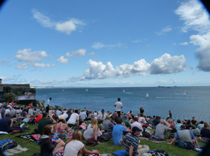Please note, this page has been archived and is no longer being updated.
The Swiss Olympic and Israeli Paralympic sailing teams have been able to take the wind out of their opponent’s sails with the help of a student’s MSc thesis.
The thesis on “ Weather patterns for sailing in Weymouth Bay and Portland Harbour: Analysis for the 2012 Olympic Games” was written by Louisa Ververs when she was a student at ETH Zurich in close collaboration with Swansea University.
Louisa was selected by and supervised by Dr Natascha Kljun, Senior Lecturer in the Department of Geography at Swansea University. Dr Kljun has strong links with ETH Zurich where Meteorology and Climate Sciences are taught and is invited each year to teach a seminar in applied meteorology for sailors and she had been approached by the CEO of the Swiss Olympic sailing team, in the light of the Olympic Games, to find a suitable student to undertake the thesis.

In sailing there is a general believe that home competitors have the edge as they know the local weather patterns. Foreign competitors often rely on meteorologists to determine future weather conditions. Louisa’s thesis looked at local weather patterns in Weymouth, host for the Olympic sailing competitions, using historical weather data provided by the UK MetOffice and a complex computer model.
During her research Louisa had regular contact with the Swiss sailing team coach and the local hired weather expert so when she moved to the UK after finishing the thesis it didn’t take much to convince them to take her on for the Olympics as an assistant.

Armed with binoculars, compass, camera, notepad and flags she spent the Olympics sitting on the coastline looking at clouds and taking photos and notes of interesting gust bands and at the end of the day briefed the head meteorologist on her findings so the sailor’s could anticipate wind changes and local weather patterns. Louisa said it had been a great experience, not only to be part of the Olympics but also to observe something she had been studying on a computer screen miles away for the last 6 months and to see that all her research work had been put to good use.
Now it’s time for the Paralympics and Louisa has already been approached by the Israeli sonar sailing team to share her findings with them. With limited public knowledge on local weather patterns and varying wind behaviour, the sailors and their meteorologists have had a very challenging regatta.
Louisa graduated this spring with the equivalent of first class honours for her thesis and has said several times what a fantastic experience it has been and that the collaboration between ETH Zurich and Swansea University offers great opportunities for her and other student’s future careers.
- Tuesday 18 September 2012 01.00 BST
- Wednesday 5 September 2012 18.43 BST
- Swansea University, Tel: 01792 295050
